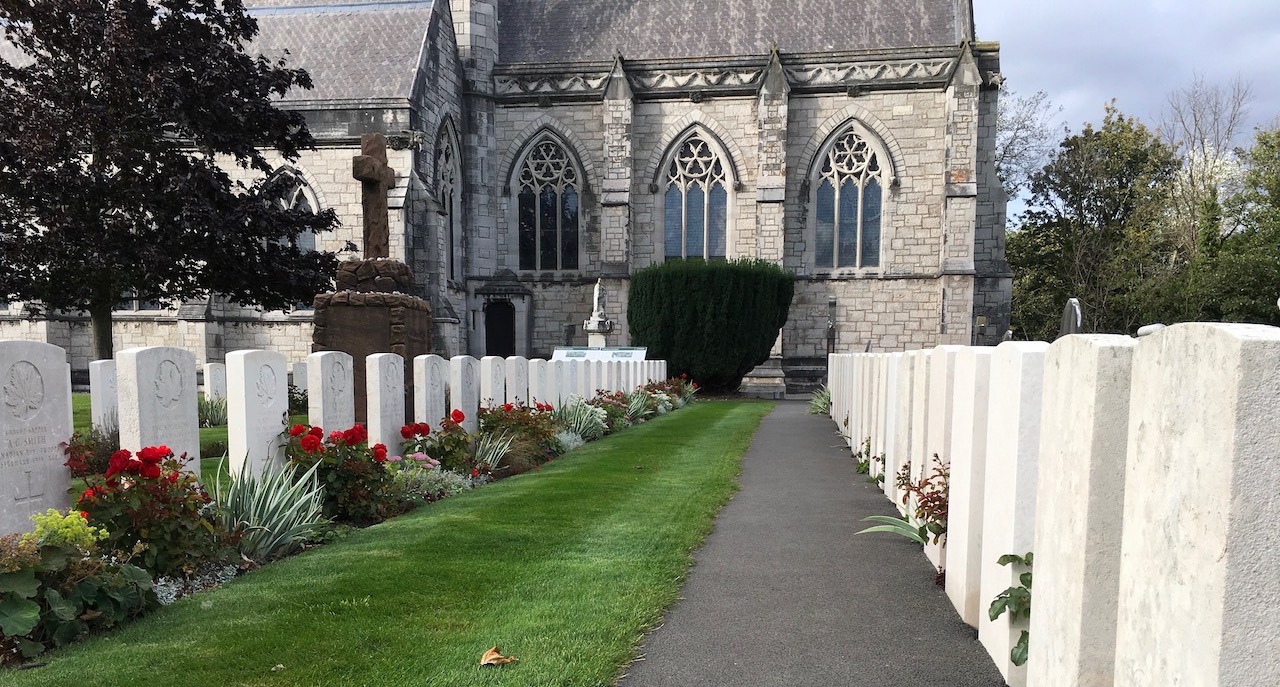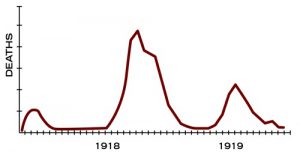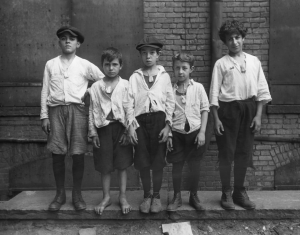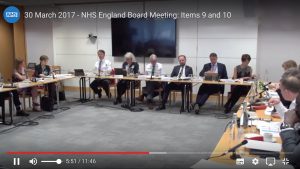Saturday 28 March 2020

The graves at Bodelwyddan – most died of Spanish ‘flu
The problem with being a writer, and a doctor too, is that I spend so much time in graveyards. They are generally where I first go when I am visiting somewhere different, as a cemetery says so much about history.
It was why, a few months before our current Covid Crisis, I was sitting on a low stone wall beside St Margaret’s Church in the Welsh village of Bodelwyddan. It was cold, a sunny day with a biting Welsh wind, while before me lay 83 graves, lined in near-perfect symmetry. The graves belonged mostly to young Canadians who had died near the end of the First World War. Nearby Kinmel Camp was where they had been stationed.
Five of the graves were there because of a mutiny in March 1919, and one of the most serious riots in British military history. The Kinmel riots were why I had chosen to go there and are the subject of a different story. Yet the remainder of the graves hit me harder, especially as I am a medic. They were there because of the pandemic of Spanish influenza, which began in the spring of 1918. It was near the end of the Great War, Kinmel Camp was ripe for disease transmission, and influenza steamed through it in no time. The camp housed nearly 15,000 soldiers, sleeping 42 to a wooden hut that was designed for only 30.

The three waves of the 1918 pandemic
The 1918 influenza pandemic is said to have started in the USA, although some would argue differently, and had three phases to it. The first was low-key and appeared in the Spring of 1918. By September 1918 a second, more vicious wave occurred, and with it came most of the deaths. There were shortages of medical personnel, economies suffered, and businesses were forced to close because of sickness among the workers. There then came a third wave, in the Spring of 1919. That, too, was a killer. By the time the pandemic had finished, more than 50 million had died worldwide, largely under the age of 65 years, and extremely rapidly. It was easy to perish in less than 24 hours after influenza attacked.
As I look back on my Bodelwyddan visit, and while we today watch Covid-19 wreak its havoc, I worry that society has learned little in the past 100 years. In 1918, politicians dillydallied, the instructions they gave were based on the best scientific evidence of the time, and it was clear that society was not prepared for an event of such magnitude. The infrastructure to cope with the disease did not exist and the call went out for healthcare staff not involved in the Great War to step forward and help.
The public health response for the 1918 pandemic was to enforce measures that dated back to the Bubonic Plague. The aim was to reduce transmission by preventing contact and it was concluded that the microbe was spread by coughing and sneezing. Efforts were thus made to prevent those infected from sharing the same air as the uninfected.
The British Medical Journal of 19 October 1918 declared that good ventilation and fresh air were:
“the best of all general measures for prevention, and this implies the avoidance of crowded meetings.”
Nonessential meetings were to be prohibited, with saloons, dance halls and cinemas being closed. There was also much discussion about the closure of schools although the Journal of the American Medical Association declared that school closure was of dubious value. That journal also highlighted the problems faced by healthcare professionals, saying:
“I believe The Journal would do service by suggesting precaution that should be practiced by physicians and others in the sick room with influenza patients. Large numbers of Pennsylvania’s physicians are sickening, I am sure, because they are indifferent to danger and careless about protecting themselves from the spray of moisture from the mouth of the patient. I am getting stories every day by the score of physicians examining the chests of influenza patients in the old careless fashion, leaning over the bed with the patient talking constantly and with no attempt to have the patient cover the cough or sneeze with a towel or handkerchief. The sick rate among physicians and the death rate are appalling, and I believe physicians are needlessly sacrificing themselves because of their failure to fully appreciate what they ought to do.”
Sick patients were quarantined until all clinical manifestations of the illness had disappeared. The American Public Health Association wanted to initiate publicity about the dangers of coughing and sneezing and the careless disposal of nasal discharges, while the importance of handwashing was highlighted. Quackery and dubious medications were recommended from many sources. One favourite was a small bag of camphor draped around a child’s neck. Camphor was supposedly good for most things.

Is any of this sounding familiar? How is it that we have learned so little in more than a century?
Life is stepping up a notch in London at the moment. Having heard nothing from any of the three agencies that I approached to offer my services, not even a one-word reply, I have now heard from all three in one day. Each wants references, each needs me to be cleared to be sure I have no criminal record, and none will so far tell me what they wish me to do. It is perhaps just as well I am ex-military. I have asked two good friends to act as referees and both have already done so.
One telephoned and asked jokingly, “Are you any good at baking cakes?”
“No chance,” I replied.
“That’s what they’re asking me to say,” he replied. “Also, singalongs and art classes. Are you any use at those?”
We both laughed, as all I had offered was to keep an eye on any lonely elderly who were now stuck at home. There are so many frightened people in our country at the moment and I am sure some would welcome a chat.
“I’ll tell them that you can’t sing, can’t paint and you couldn’t bake a cake if your life depended on it,” joked my friend. “Although you are pretty good at eating,” he added.
“That’ll be fine,” I laughed in reply but have not heard since from the charity, so maybe I have been given the thumbs down.
Meanwhile the nation has been told that the number of confirmed cases is doubling approximately every three days, although how significant that is when they are so far behind with their testing, escapes me. Deaths are doubling even faster. A scientific paper from London’s Imperial College, an establishment that appears to have the Government’s ear, has said that the total number of deaths in the UK is likely to be less than 7000, which is much lower than the number quoted earlier by the Government. However, any of the numbers issued to the public about the future can only be an expert guess. The recalculation was apparently because we are now social distancing better, which had forced the bigwigs to have a rethink.
The principle of social distancing is now well understood, although not always followed. Runners, joggers and dogwalkers upset me in particular, as they appear to inhabit a different planet. Everyone else, other than building site workers who only seem happy when rubbing shoulders, are doing what they should. Put simply, without social distancing, after 30 days a single infected person can lead to 406 infections. With social distancing one person leads to 15. I rest my case. However, with such figures, it is easy to see that our current restrictions will not be over in a jiffy. Prepare yourself for a long haul.
In the UK our number of deaths has now risen to more than 1000 and so-called frontline healthcare staff are beginning to be offered testing. Critical care doctors and nurses are at the front of the queue. Meanwhile two new temporary hospitals are scheduled to be set up in Birmingham and Manchester and the development of London’s Excel Centre is proceeding fast. The Principality Stadium in Wales is also destined to become a 2000-bedded hospital.

March 2017 – NHS England Board considers England’s Emergency Response but reaches little or no conclusion
Although so much of this is commendable, I worry that our country was caught on the back foot and is rapidly playing catch-up. How about Exercise Cygnus, which took place in October 2016? The exercise simulated an influenza pandemic, and the UK failed. Limits to the NHS’s surge capacity were identified, the country ran out of PPE, and there was a shortage of intensive care beds. The results, it appears, were kept secret from the public. The matter was considered by the NHS England Board at a meeting in March 2017 and, as best I can tell, all went through on the nod.
Now is not the time for heads to roll but I will wager, when this Covid Crisis is over, there will be bigwigs who will be asked to justify their existence, and their earlier decisions. But then, with a crisis of this magnitude, how is it possible to truly plan?
